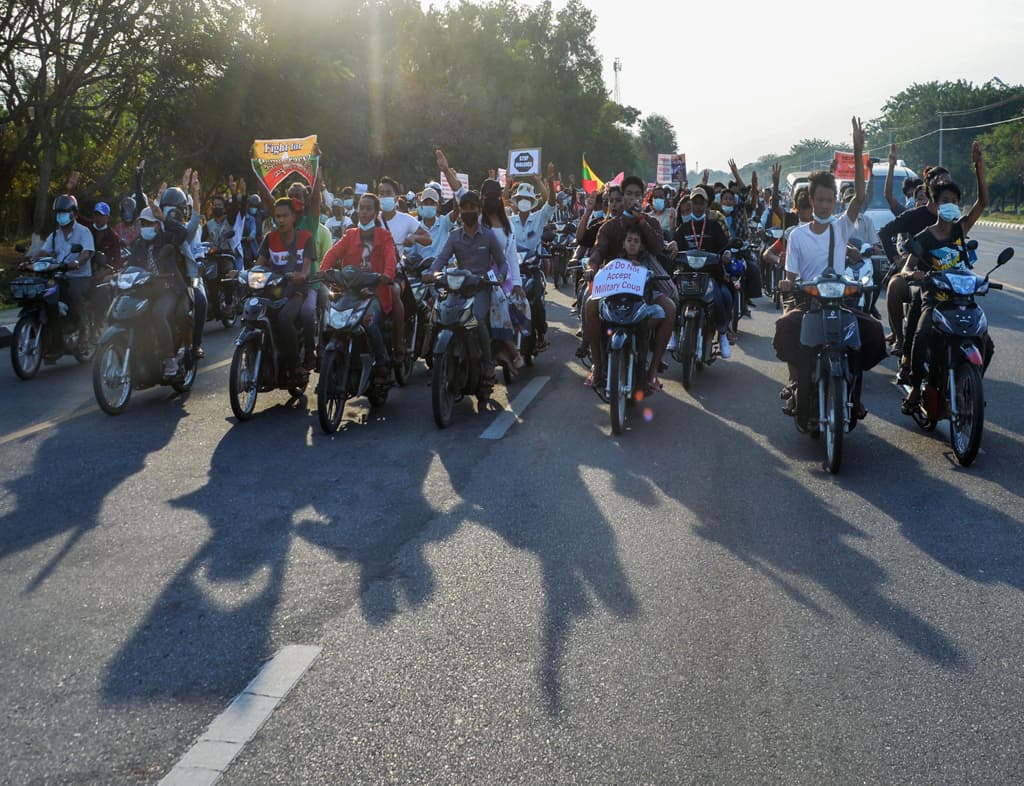Myanmar protesters clap to denounce junta as region focuses on crisis
- Demonstrators denounce junta, urge international help.
- ASEAN chair orders preparations for a meeting on Myanmar.
- Junta boss says military exercising 'utmost restraint'.
- Fitch Solutions sees 20% GDP contraction for Myanmar.
Protesters in Myanmar clapped together on Monday in the latest show of dissent against the military junta, as a regional bloc prepared for talks on the crisis that has killed nearly 600 people.
Clapping began in various parts of the main city Yangon at 5 p.m. (1030 GMT) in response to a call by protest organisers, residents said.
The gesture would honour "Ethnic Armed Organisations and Gen Z defence youths from Myanmar including Yangon who are fighting in the revolution... on behalf of us," Ei Thinzar Maung, a protest leader, wrote on Facebook.
Despite the killing of at least 564 people by the security forces since the Feb. 1 coup, protesters have been coming out every day, often in small groups in small towns, to voice opposition to the overthrow of an elected government led by Aung San Suu Kyi and the return of military rule.
The movement, which some protesters are calling a "spring revolution", has included street marches, a civil disobedience campaign of strikes and quirky acts of rebellion organised via social media.
In addition to the crackdown on the streets, the junta has sought to suppress the campaign by shutting down wireless broadband and mobile data services.
On Monday, one person was killed in the central Sagaing region when security forces broke up a protest, the Myanmar Now news outlet reported. Earlier, demonstrators with placards of Suu Kyi and signs calling for international intervention marched through the second-biggest city Mandalay, images posted on social media showed.
Brunei, chair of the 10-member Association of Southeast Asian Nations (ASEAN), threw its support on Monday behind a regional leaders' meeting to discuss Myanmar.
After talks between Malaysian Prime Minister Muhyiddin Yassin and Brunei Sultan Hassanal Bolkiah, Brunei said both countries had asked their ministers and officials to make the "necessary preparations for the meeting that will be held at the ASEAN Secretariat in Jakarta, Indonesia."
No date was given.
ASEAN operates by consensus, but the divergent views of its members on how to respond to the Myanmar army's crackdown on civilians and the group's policy of non-interference has limited its ability to act.
Malaysia, Indonesia, the Philippines and Singapore have all expressed alarm over the killings of demonstrators and support an urgent high-level meeting on Myanmar. Besides Brunei, the other ASEAN members are Myanmar itself, Thailand, Laos, Vietnam and Cambodia.
The United States and other Western countries have denounced the coup and called for the release of Suu Kyi, who won the Nobel Peace Prize in 1991 for her campaign against military rule. She has been charged with violating an official secrets act that is punishable by up to 14 years in prison.
JUNTA REBUTS UN ENVOY
The junta said on Monday that comments last week by UN Special Envoy Christine Schraner Burgener about an impending "bloodbath" in Myanmar were inaccurate and misleading.
"Ms. Burgener's remarks contravene the basic principles of sovereignty, and the fact that the United Nations is meant to work towards peace and stability of the world's nations," it said in a notice in the state-run Global New Light of Myanmar newspaper.
Schraner Burgener told the 15-member UN Security Council on March 31 that it must consider "potentially significant action" to reverse the course of events as "a bloodbath is imminent," according to comments published by UN News.
The junta said the remarks were a "a far cry from reality and could delay and destabilise the efforts by the State Administration Council to establish a genuine and disciplined multiparty democracy".
The coup and subsequent crackdown has led to Western sanctions on the military and its lucrative businesses.
Fitch Solutions said on Monday that a conservative forecast for Myanmar's economy would be for a 20% contraction in the fiscal year that began in October, instead of the 2% seen before the coup.
External pressure is growing on the military to stop the violence, with some countries calling for it to cede power and free all detainees, and others urging dialogue and new elections soon.
A total of 2,667 people have been detained under the junta, the Association for Political Prisoners (AAPP) activist group said on Monday.
The junta at the weekend announced arrest warrants for about 60 celebrities, social media influencers, models and musicians on charges of incitement.
The military, which ruled with an iron first for half a century until 2011, has also seen fighting with armed ethnic minorities reignite on at least two fronts, raising fears of growing conflict and chaos in the country.

























Comments
Comments are closed.